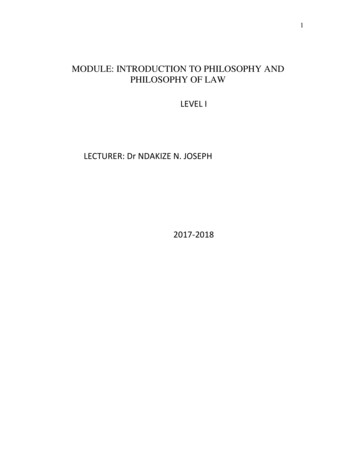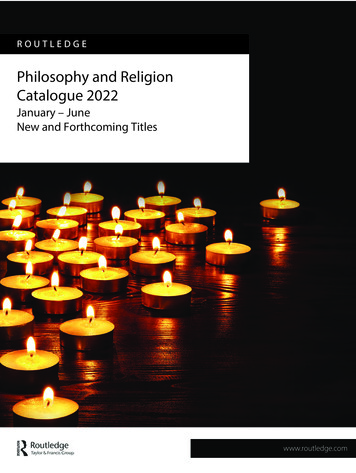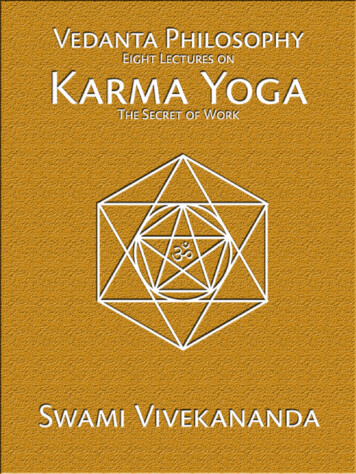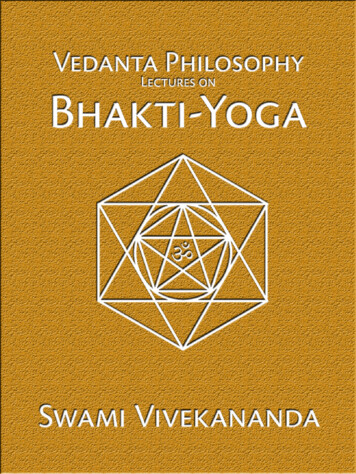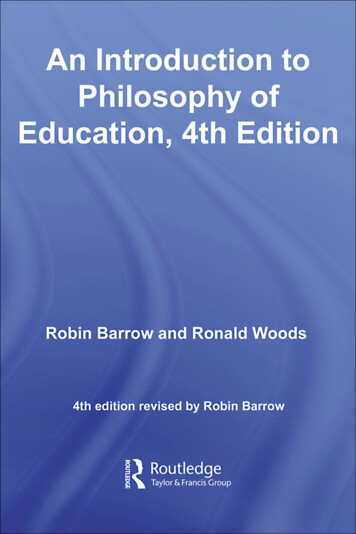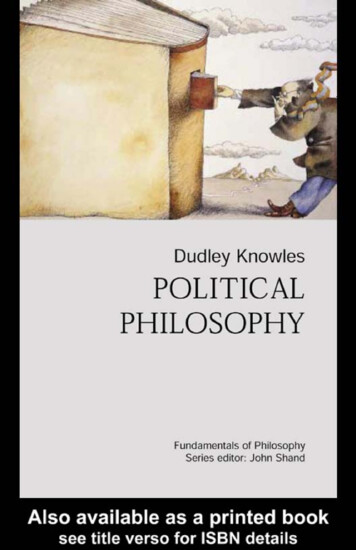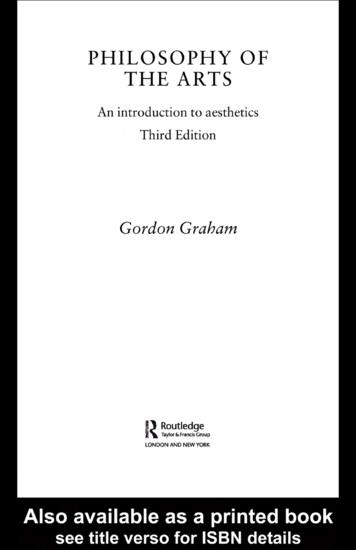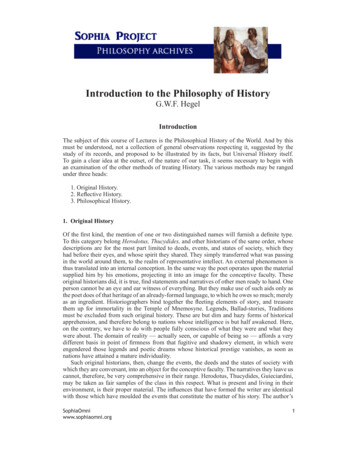
Transcription
Introduction to the Philosophy of HistoryG.W.F. HegelIntroductionThe subject of this course of Lectures is the Philosophical History of the World. And by thismust be understood, not a collection of general observations respecting it, suggested by thestudy of its records, and proposed to be illustrated by its facts, but Universal History itself.To gain a clear idea at the outset, of the nature of our task, it seems necessary to begin withan examination of the other methods of treating History. The various methods may be rangedunder three heads:1. Original History.2. Reflective History.3. Philosophical History.1. Original HistoryOf the first kind, the mention of one or two distinguished names will furnish a definite type.To this category belong Herodotus, Thucydides, and other historians of the same order, whosedescriptions are for the most part limited to deeds, events, and states of society, which theyhad before their eyes, and whose spirit they shared. They simply transferred what was passingin the world around them, to the realm of representative intellect. An external phenomenon isthus translated into an internal conception. In the same way the poet operates upon the materialsupplied him by his emotions, projecting it into an image for the conceptive faculty. Theseoriginal historians did, it is true, find statements and narratives of other men ready to hand. Oneperson cannot be an eye and ear witness of everything. But they make use of such aids only asthe poet does of that heritage of an already-formed language, to which he owes so much; merelyas an ingredient. Historiographers bind together the fleeting elements of story, and treasurethem up for immortality in the Temple of Mnemosyne. Legends, Ballad-stories, Traditionsmust be excluded from such original history. These are but dim and hazy forms of historicalapprehension, and therefore belong to nations whose intelligence is but half awakened. Here,on the contrary, we have to do with people fully conscious of what they were and what theywere about. The domain of reality — actually seen, or capable of being so — affords a verydifferent basis in point of firmness from that fugitive and shadowy element, in which wereengendered those legends and poetic dreams whose historical prestige vanishes, as soon asnations have attained a mature individuality.Such original historians, then, change the events, the deeds and the states of society withwhich they are conversant, into an object for the conceptive faculty. The narratives they leave uscannot, therefore, be very comprehensive in their range. Herodotus, Thucydides, Guieciardini,may be taken as fair samples of the class in this respect. What is present and living in theirenvironment, is their proper material. The influences that have formed the writer are identicalwith those which have moulded the events that constitute the matter of his story. The author’sSophiaOmniwww.sophiaomni.org1
spirit, and that of the actions he narrates, is one and the same. He describes scenes in whichhe himself has been an actor, or at any rate an interested spectator. It is short periods of time,individual shapes of persons and occurrences, single unreflected traits, of which he makeshis picture. And his aim is nothing more than the presentation to posterity of an image ofevents as clear as that which he himself possessed in virtue of personal observation, or life-likedescriptions. Reflections are none of his business, for he lives in the spirit of his subject; hehas not attained an elevation above it. If, as in Caesar’s case, he belongs to the exalted rank ofgenerals or statesmen, it is the prosecution of his own aims that constitutes the history.Such speeches as we find in Thucydides (for example) of which we can positively assert thatthey are not bona fide reports, would seem to make against our statement that a historian of hisclass presents us no reflected picture; that persons and people appear in his works in propriapersona. Speeches, it must be allowed, are veritable transactions in the human commonwealth;in fact, very gravely influential transactions. It is, indeed, often said, “Such and such things areonly talk”; by way of demonstrating their harmlessness. That for which this excuse is brought,may be mere “talk”; and talk enjoys the important privilege of being harmless. But addressesof peoples to peoples, or orations directed to nations and to princes, are integrant constituentsof history. Granted such orations as those of Pericles — the most profoundly accomplished,genuine, noble statesman—were elaborated by Thucydides; it must yet be maintained that theywere not foreign to the character of the speaker. In the oration in question, these men proclaimthe maxims adopted by their countrymen, and which formed their own character; they recordtheir views of their political relations, and of their moral and spiritual nature; and the principleof their designs and conduct. What the historian puts into their mouths is no supposititioussystem of ideas, but an uncorrupted transcript of their intellectual and moral habitudes.Of these historians, whom we must make thoroughly our own, with whom we must lingerlong, if we would live with their respective nations, and enter deeply into their spirit: of thesehistorians, to whose pages we may turn not for the purpose of erudition merely, but with aview to deep and genuine enjoyment, there are fewer than might be imagined. Herodotus theFather, i.e. the Founder of History and Thucydides have been already mentioned. Xenophon’sRetreat of the Ten Thousand is a work equally original. Caesar’s Commentaries are the simplemasterpiece of a mighty spirit. Among the ancients, these annalists were necessarily greatcaptains and statesmen. In the Middle Ages, if we except the Bishops, who were placed in thevery centre of the political world, the Monks monopolize this category as naive chroniclers whowere as decidedly isolated from active life as those elder annalists had been connected withit. In modern times the relations are entirely altered. Our culture is essentially comprehensiveand immediately changes all events into historical representations. Belonging to the class inquestion, we have vivid, simple, clear narrations—especially of military transactions—whichmight fairly take their place with those of Caesar. In richness of matter and fulness of detail asregards strategic appliances, and attendant circumstances, they are even more instructive. TheFrench “Memoires” also fall under this category. In many cases these are written by men ofmark, though relating to affairs of little note. They not unfrequently contain a large proportionof anecdotical matter, so that the ground they occupy is narrow and trivial. Yet they are oftenveritable masterpieces in history; as those of Cardinal Retz, which in fact trench on a largerhistorical field. In Germany such masters are rare. Frederick the Great (“Histoire de montemps”) is an illustrious exception. Writers of this order must occupy an elevated position.Only from such a position is it possible to take an extensive view of affairs—to see everything.This is out of the question for him, who from below merely gets a glimpse of the great worldthrough a miserable cranny.2. Reflective HistoryThe second kind of history we may call the reflective. It is history whose mode of representationis not really confined by the limits of the time to which it relates, but whose spirit transcends theSophiaOmniwww.sophiaomni.org2
present. In this second order strongly marked variety of species may be distinguished.1. It is the aim of the investigator to gain a view of the entire history of a people or a country,or of the world, in short, what we call Universal History. In this case the working up of thehistorical material is the main point. The workman approaches his task with his own spirit; aspirit distinct from that of the element he is to manipulate. Here a very important considerationwill be the principles to which the author refers, the bearing and motives of the actions andevents which he describes, and those which determine the form of his narrative. Among usGermans this reflective treatment and the display of ingenuity which it occasions, assume amanifold variety of phases. Every writer of history proposes to himself an original method. TheEnglish and French confess to general principles of historical composition. Their standpointis more that of cosmopolitan or of national culture. Among us each labours to invent a purelyindividual point of view. Instead of writing history, we are always beating our brains to discoverhow history ought to be written. This first kind of Reflective History is most nearly akin to thepreceding, when it has no farther aim than to present the annals of a country complete. Suchcompilations (among which may be reckoned the works of Livy, Diodorus Siculus, Johannesvon Müller’s History of Switzerland) are, if well performed, highly meritorious. Among thebest of the kind may be reckoned such annalist as approach those of the first class; who give sovivid a transcript of events that the reader may well fancy himself listening to contemporariesand eye-witnesses. But it often happens that the individuality of tone which must characterizea writer belonging to a different culture, is not modified in accordance with the periods sucha record must traverse. The spirit of the writer is quite other than that of the times of whichhe treats. Thus Livy puts into the mouths of the old Roman kings, consuls, and generals, suchorations as would be delivered by an accomplished advocate of the Livian era, and whichstrikingly contrast with the genuine traditions of Roman antiquity (e.g. the fable of MeneniusAgrippa). In the same way he gives us descriptions of battles, as if he bad been an actualspectator; but whose features would serve well enough for battles in any period, and whosedistinctness contrasts on the other hand with the want of connexion and the inconsistency thatprevail elsewhere, even in his treatment of chief points of interest. The difference between sucha compiler and an original historian may be best seen by comparing Polybius himself with thestyle in which Livy uses, expands, and abridges his annals in those period; of which Polybius’saccount has been preserved. Johann von Müller has given a stiff, formal, pedantic aspect ofhistory, in the endeavour to remain faithful in his portraiture to the times he describes. We muchprefer the narratives we find in old Tschudy. All is more naive and natural than it appears in thegarb of a fictitious and affected archaism.A history which aspires to traverse long periods of time, or to be universal, must indeedforego the attempt to give individual representations of the past as it actually existed. It mustforeshorten its pictures by abstractions; and this includes not merely the omission of eventsand deeds, but whatever is involved in the fact that Thought is, after all, the most trenchantepitomist. A battle, a great victory, a siege, no longer maintains its original proportions, but isput off with a bare mention. When Livy e.g. tells us of the wars with the Volsci, we sometimeshave the brief announcement: “This year war was carried on with the Volsci.”2. A second species of Reflective History is what we may call the Pragmatical. When wehave to deal with the Past, and occupy ourselves with a remote world a Present rises into beingfor the mind — produced by its own activity, as the reward of its labour. The occurrencesare, indeed, various; but the idea which pervades them — their deeper import and connexion— is one. This takes the occurrence out of the category of the Past and makes it virtuallyPresent. Pragmatical (didactic) reflections, though in their nature decidedly abstract, are trulyand indefeasibly of the Present, and quicken the annals of the dead Past with the life of today.Whether, indeed such reflections are truly interesting and enlivening, depends on the writer’sown spirit. Moral reflections must here be specially noticed, — the moral teaching expected fromhistory; which latter has not unfrequently been treated with a direct view to the former. It maybe allowed that examples of virtue elevate the soul, and are applicable in the moral instructionsof children for impressing excellence upon their minds. But the destinies of peoples and states,SophiaOmniwww.sophiaomni.org3
their interests, relations, and the complicated issue of their affairs, present quite another field.Rulers, Statesmen, Nations, are wont to be emphatically commended to the teaching whichexperience offers in history. But what experience and history teach is this, — that peoples andgovernments never have learned anything from history, or acted on principles deduced from it.Each period is involved in such peculiar circumstances, exhibits a condition of things so strictlyidiosyncratic, that its conduct must be regulated by considerations connected with itself, anditself alone. Amid the pressure of great events, a general principle gives no help. It is uselessto revert to similar circumstances in the Past. The pallid shades of memory struggle in vainwith the life and freedom of the Present. Looked at in this light, nothing can be shallower thanthe oft-repeated appeal to Greek and Roman examples during the French Revolution. Nothingis more diverse than the genius of those nations and that of our times. Johannes v. Müller, inhis Universal History as also in his History of Switzerland, had such moral aims in view. Hedesigned to prepare a body of political doctrines for the instruction of princes, governmentsand peoples (he formed a special collection of doctrines and reflections, — frequently givingus in his correspondence the exact number of apophthegms which he had compiled in a week);but he cannot reckon this part of his labour as among the best that he accomplished. It isonly a thorough, liberal, comprehensive view of historical relations (such e.g. as we find inMontesquieu’s “Esprit des Loix”), that can give truth and interest to reflections of this order.One Reflective History therefore supersedes another. The materials are patent to every writer:each is likely enough to believe himself capable of arranging and manipulating them; and wemay expect that each will insist upon his own spirit as that of the age in question. Disgusted bysuch reflective histories readers have often returned to a with pleasure to a narrative adoptingno particular point of view. These certainly have their value; but for the most part they offeronly material for history. We Germans are not content with such. The French, on the other hand,display great genius in reanimating bygone times, and in bringing the past to bear upon thepresent conditions of things.3. The third form of Reflective History is the Critical. This deserves mention as preeminentlythe mode of treating history, now current in Germany. It is not history itself that is here presented.We might more properly designate it as a History of History; a criticism of historical narrativesand an investigation of their truth and credibility. Its peculiarity in point of fact and of intention,consists in the acuteness with which the writer extorts something from the records which wasnot in the matters recorded. The French have given as much that is profound and judicious inthis class of composition. But they have not endeavoured to pass a merely critical procedure forsubstantial history. They have duly presented their judgments in the form of critical treatises.Among us, the so-called “higher criticism,” which reigns supreme in the domain of philology,has also taken possession of our historical literature. This “higher criticism” has been the pretextfor introducing all the anti-historical monstrosities that a vain imagination could suggest. Herewe have the other method of making the past a living reality; putting subjective fancies inthe place of historical data; fancies whose merit is measured by their boldness, that is, thescantiness of the particulars on which they are based, and the peremptoriness with which theycontravene the best established facts of history.4. The last species of Reflective History announces its fragmentary character on the veryface of it. It adopts an abstract position; yet, since it takes general points of view (e.g. as theHistory of Art, of Law, of Religion), it forms a transition to the Philosophical History of theWorld. In our time this form of the history of ideas has been more developed and broughtinto notice. Such branches of national life stand in close relation to the entire complex of apeople’s annals; and the question of chief importance in relation to our subject is, whetherthe connexion of the whole is exhibited in its truth and reality, or referred to merely externalrelations. In the latter case, these important phenomena (Art, Law, Religion,& c.) appear aspurely accidental national peculiarities. It must be remarked that, when Reflective History hasadvanced to the adoption of general points of view, if the position taken is a true one, theseare found to constitute — not merely external thread, a superficial series — but are the inwardguiding soul of the occurrences and actions that occupy a nation’s annals. For, like the soulSophiaOmniwww.sophiaomni.org4
conductor Mercury, the Idea is in truth, the leader of peoples and of the World; and Spirit, therational and necessitated will of that conductor, is and has been the director of the events of theWorld’s History. To become acquainted with Spirit in this its office of guidance, is the object ofour present undertaking. This brings us to3. Philosophical HistoryThe third kind of history, — the Philosophical. No explanation was needed of the two previousclasses; their nature was self-evident. It is otherwise with this last, which certainly seems torequire an exposition or justification. The most general definition that can be given, is, thatthe Philosophy of History means nothing but the thoughtful consideration of it. Thought is,indeed. essential to humanity. It is this that distinguishes us from the brutes. In sensationscognition and intellection; in our instincts and volitions, as far as they are truly human Thoughtis an invariable element. To insist upon Thought in this connexion with history, may, however,appear unsatisfactory. In this science it would seem as if Thought must be subordinate to whatis given to the realities of fact; that this is its basis and guide: while Philosophy dwells inthe region of self-produced ideas, without reference to actuality. Approaching history thusprepossessed, Speculation might be expected to treat it as a mere passive material; and, sofar from leaving it in its native truth, to force- it into conformity with a tyrannous idea, and toconstrue it, as the phrase is, “à priori.” But as it is the business of history simply to adopt intoits records what is and has been, actual occurrences and transactions; and since it remains trueto its character in proportion as it strictly adheres to its data, we seem to have in Philosophy,a process diametrically opposed to that of the historiographer. This contradiction, and thecharge consequent brought against speculation, shall be explained and confuted. We do not,however, propose to correct the innumerable special misrepresentations, trite or novel, that arecurrent respecting the aims, the interests, and the modes of treating history, and its relation toPhilosophy.The only Thought which Philosophy brings with it to the contemplation of History, is thesimple conception of Reason; that Reason is the Sovereign of the World; that the history of theworld therefore, presents us with a rational process. This conviction and intuition is a hypothesisin the domain of history as such. In that of Philosophy it is no hypothesis. It is there proved byspeculative cognition, that Reason — and this term may here suffice us, without investigatingthe relation sustained by the Universe to the Divine Being, — is Substance, as well as InfinitePower; its own Infinite Material underlying all the natural and spiritual life which it originates,as also the Infinite Form, — that which sets this Material in motion. On the one hand, Reasonis the substance of the Universe; viz. that by which and in which all reality has its being andsubsistence. On the other hand, it is the Infinite Energy of the Universe; since Reason is not sopowerless as to be incapable of producing anything but a mere ideal, a mere intention—havingits place outside reality, nobody knows where; something separate and abstract, in the heads ofcertain human beings. It is the infinite complex of things, their entire Essence and Truth. It isits own material which it commits to its own Active Energy to work up; not needing, as finiteaction does, the conditions of an external material of given means from which it may obtainits support, and the objects of its activity. It supplies its own nourishment and is the object ofits own operations. While it is exclusively its own basis of existence, and absolute final aim,it is also the energising power realising this aim; developing it not only in the phenomena ofthe Natural, but also of the Spiritual Universe — the History of the World. That this “Idea” or“Reason” is the True, the Eternal, the absolutely powerful essence; that it reveals itself in theWorld, and that in that World nothing else is revealed but this and its honour and glory—isthe thesis which, as we have said, has been proved in Philosophy and is here regarded asdemonstrated.In those of my hearers who are not acquainted with Philosophy, I may fairly presume, atleast, the existence of a belief in Reason, a desire, a thirst for acquaintance with it, in enteringSophiaOmniwww.sophiaomni.org5
upon this course of Lectures. It is in fact, the wish for rational insight, not the ambition toamass a mere heap of acquirements, that should be presupposed in every case as possessingthe mind of the learner in the study of science. If the clear idea of Reason is not alreadydeveloped in our minds, in beginning the study of Universal History, we should at least leavethe firm, unconquerable faith that Reason does exist there; and that the World of intelligenceand conscious volition is not abandoned to chance, but must shew itself in the light of the selfcognizant Idea. Yet I am not obliged to make any such preliminary demand upon your faith.What I have said thus provisionally, and what I shall have further to say, is, even in reference toour branch of science, not to be regarded as hypothetical, but as a summary view of the whole;the result of the investigation we are about to pursue; a result which happens to be known to me,because I have traversed the entire field. It is only an inference from the history of the World,that its development has been a rational process; that the history in question has constitutedthe rational necessary course of the World Spirit — that Spirit whose nature is always one andthe same, but which unfolds this its one nature in the phenomena of the World’s existence.This must, as before stated, present itself as the ultimate result of History. But we have to takethe latter as it is. We must proceed historically — empirically. Among other precautions wemust take care not to be misled by professed historians who (especially among the Germans,and enjoying a considerable authority), are chargeable with the very procedure of which theyaccuse the Philosopher — introducing à priori inventions of their own into the records of thePast. It is, for example, a widely current fiction, that there was an original primaeval people,taught immediately by God, endowed with perfect insight and wisdom, possessing a thoroughknowledge of all natural laws and spiritual truth; that there have been such or such sacerdotalpeoples; or, to mention a more specific averment, that there was a Roman Epos, from whichthe Roman historians derived the early annals of their city, &c. Authorities of this kind weleave to those talented historians by profession, among whom (in Germany at least) their useis not uncommon. — We might then announce it as the first condition to be observed, that weshould faithfully adopt all that is historical. But in such general expressions themselves, as“faithfully” and “adopt,” lies the ambiguity. Even the ordinary, the “impartial” historiographer,who believes and professes that he maintains a simply receptive attitude; surrendering himselfonly to the data supplied him—is by no means passive as regards the exercise of his thinkingpowers. He brings his categories with him, and sees the phenomena presented to his mentalvision, exclusively through these media. And, especially in all that pretends to the name ofscience, it is indispensable that Reason should not sleep—that reflection should be in full play.To him who looks upon the world rationally, the world in its turn, presents a rational aspect. Therelation is mutual. But the various exercises of reflection—the different points of view—themodes of deciding the simple question of the relative importance of events (the first categorythat occupies the attention of the historian), do not belong to this place.I will only mention two phases and points of view that concern the generally diffusedconviction that Reason has ruled, and is still ruling in the world, and consequently in the world’shistory; because they give us, at the same time, an opportunity for more closely investigatingthe question that presents the greatest difficulty, and for indicating a branch of the subject,which will have to be enlarged on in the sequel.I. One of these points is, that passage in history, which informs us that the Greek Anaxagoraswas the first to enunciate the doctrine that Understanding generally, or Reason, governs theworld. It is not intelligence as self-conscious Reason, — not a Spirit as such that is meant; andwe must clearly distinguish these from each other. The movement of the solar system takesplace according to unchangeable laws. These laws are Reason, implicit in the phenomena inquestion. But neither the sun nor the planets, which revolve around it according to these laws,can be said to have any consciousness of them.A thought of this kind, — that Nature is an embodiment of Reason; that it is unchangeablysubordinate to universal laws, appears nowise striking or strange to us. We are accustomedto such conceptions, and find nothing extraordinary in them. And I have mentioned thisextraordinary occurrence, partly to shew how history teaches, that ideas of this kind, which maySophiaOmniwww.sophiaomni.org6
seem trivial to us, have not always been in the world; that on the contrary, such a thought makesan epoch in the annals of human intelligence. Aristotle says of Anaxagoras, as the originatorof the thought in question, that he appeared as a sober man among the drunken. Socratesadopted the doctrine from Anaxagoras, and it forthwith became the ruling idea in Philosophy,except in the school of Epicurus, who ascribed all events to chance. “I was delighted with thesentiment,” — Plato makes Socrates say — “and hoped I had found a teacher who would shewme Nature in harmony with Reason, who would demonstrate in each particular phenomenon itsspecific aim, and in the whole, the grand object of the Universe. I would not have surrenderedthis hope for a great deal. But how very much was I disappointed, when, having zealouslyapplied myself to the writings of Anaxagoras, I found that he adduces only external causes,such as Atmosphere, Ether, Water, and the like.” It is evident that the defect which Socratescomplains of respecting Anaxagoras’s doctrine, does not concern the principle itself, but theshortcoming of the propounder in applying it to Nature in the concrete. Nature is not deducedfrom that principle: the latter remains in fact a mere abstraction, inasmuch as the former is notcomprehended and exhibited as a development of it, — an organisation produced by and fromReason. I wish, at the very outset, to call your attention to the important difference between aconception, a principle, a truth limited to an abstract form and its determinate application, andconcrete development. This distinction affects the whole fabric of philosophy; and among otherbearings of it there is one to which we shall have to revert at the close of our view of UniversalHistory, in investigating the aspect of political affairs in the most recent period.We have next to notice the rise of this idea — that Reason directs the World—in connexionwith a further application of it, well known to us, — in the form, viz. of the religious truth, thatthe world is not abandoned to chance and external contingent causes, but that a Providencecontrols it. I stated above, that I would not make a demand on your faith, in regard to theprinciple announced. Yet I might appeal to your belief in it, in this religious aspect, if, as ageneral rule, the nature of philosophical science allowed it to attach authority to presuppositions.To put it in another shape, — this appeal is forbidden, because the science of which we have totreat, proposes itself to furnish the proof (not indeed of the abstract Truth of the doctrine, but)of its correctness as compared with facts. The truth, then, that a Providence (that of God)presides over the events of the World — consorts with the proposition in question; for DivineProvidence is Wisdom, endowed with an infinite Power which realises its aim, viz. the absoluterational-design of the World. Reason is Thought conditioning itself with perfect freedom. Buta difference—rather a contradiction — will manifest itself, between this belief and our principle,just as was the case in reference to the demand made by Socrates in the case of Anaxagoras’sdictum. For that belief is similarly indefinite; it is what is called a belief in a general Providence,and is not followed out into definite application, or
Introduction to the Philosophy of History G.W.F. Hegel Introduction The subject of this course of Lectures is the Philosophical History of the World. And by this must be understood, not a collection of general observations respecting it, suggested by the study of its records, and proposed

